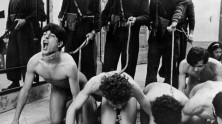



The Complete Pier Paolo Pasolini
Celebrated the world over as one of the central figures of the postwar Italian cinema, Pier Paolo Pasolini (1922-1975) is recognized in his native land as arguably the most important Italian artist and intellectual of the twentieth century. A gifted writer and penetrating thinker, Pasolini was already renowned as a poet, novelist, critic and screenwriter before he directed his first film, Accattone, in 1960. Pasolini remained prodigiously industrious as a writer and political activist throughout his career, even as his films brought him greater celebrity—and notoriety—during the last fifteen years of his life, often overshadowing other facets of his remarkably diverse accomplishments. An outspoken but unorthodox leftist, Pasolini attracted controversy from all sides of the political spectrum, with his often sexually explicit and willingly perverse films drawing the frequent ire of Italian censors. With his penchant for political critique and stylistic reinvention, Pasolini is in some ways the Italian counterpart to Jean-Luc Godard. Despite his obvious glee in shocking the bourgeoisie, Pasolini was also a thoughtful, even philosophical, filmmaker who bridged the gap between the post-neorealist group led by Fellini and Antonioni and the generation of Young Turks that included Bernardo Bertolucci and Marco Bellocchio.
Pasolini’s cinema is perhaps best remembered today for its unbridled sexual imagination and its often shocking depictions of violence and unorthodox sexuality. Equally important to his oeuvre, however, is Pasolini’s adamant rejection of the contemporary world. A profound nostalgia for a pre-modern way of life is expressed across Pasolini’s films, in which the magical and the pagan supersede rationality and religion, and an anarchic, polymorphous eroticism replaces what Pasolini regarded as the sharply alienated and alienating state of modern existence. Pasolini refined an extraordinary visual style to express this worldview, favoring static frontal shots evocative of pre- and early Renaissance painting. Most of all, however, Pasolini prized a mode of radical stylistic impurity, using Bach and Vivaldi, for example, as the unlikely yet profoundly fitting soundtrack to his visions of life in the Roman slums. This daring juxtaposition of “high” and “low,” a poetic version of the Marxist dialectic, remained one of Pasolini’s most influential stylistic touches.
During his career a major source of Pasolini’s notoriety was his open homosexuality, a then-rare position that he actually had little choice in establishing. In 1949, while living and teaching as a regional poet in northeast Italy, Pasolini was outed and promptly charged with corrupting a minor, resulting in the loss of both his teaching post and his membership in the Italian Communist Party. The subsequent scandal prompted Pasolini to flee to Rome and, in retrospect, may have inadvertently hastened his rise to prominence in Italian literature. Today Pasolini’s grisly and still unsolved murder, perhaps at the hands of a teenaged hustler, has permanently linked his homosexuality to his public profile.
Pasolini announced his unique style and approach to narrative with his first three works—Accattone, Mamma Roma and The Gospel According to Matthew—which each offer a reworking of the legacy of postwar Italian neo-realism. In the mid-1960s Pasolini made an abrupt turn by attempting to create his own version of a popular cinema, casting the comic star Totò in a group of films, most notably Hawks and Sparrows, using humor and allegory to critique the changes brought about by Italy’s economic and industrial boom. The tepid response to these unusual comedies inspired Pasolini to proclaim allegiance to “unpopular cinema,” and turn to the melding of myth and scathing political critique that resulted in Oedipus Rex, Medea and Pigsty. Pasolini changed course again with his “Trilogy of Life,” an unprecedentedly accessible series of literary adaptations —The Decameron, The Canterbury Tales and Arabian Nights—until finally rejecting these films with the savage Salò, the ultimate film maudit, which he finished just days before his premature death. This retrospective covers all of the many phases of Pasolini’s filmmaking by including each of his thirteen features and his most important shorts, as well as a reconstruction of La rabbia, a film long considered lost.
























